Find Competitor PPC Keywords and Win (With an Expert, Not a Bloated Agency)
- Chase McGowan

- Oct 22, 2025
- 14 min read
When you hear "competitor PPC keywords," what comes to mind? Simply put, these are the search terms your rivals are bidding on in Google Ads to get in front of your ideal customers. Figuring out what those keywords are is just the first domino to fall. The real magic is in analyzing their strategy with the seasoned eye of a specialist—not a junior analyst at a bloated agency—to find market gaps and win more high-intent traffic for yourself.
Why Bloated Agencies Fail at Competitor Keyword Analysis
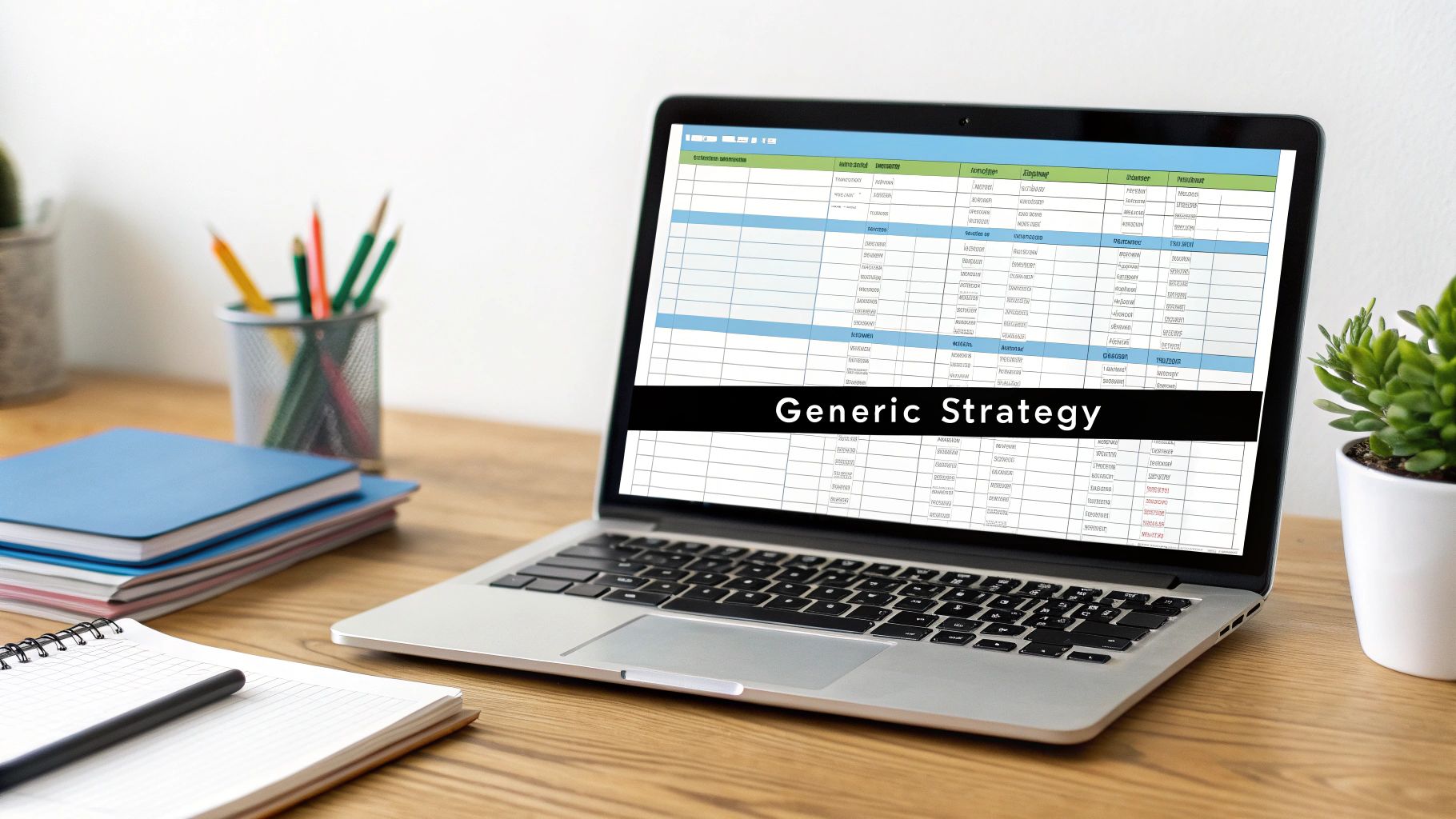
Let's cut to the chase. Most big PPC agencies treat competitor research like a box-ticking exercise. A junior account manager, likely juggling a dozen other clients, pulls a surface-level report, drops it into a generic template, and moves on. Your account is just another task on their to-do list.
This "one-size-fits-all" approach is built for their efficiency, not your bottom line. It's a system that’s fundamentally broken because it completely misses the high-impact opportunities hidden just beneath the surface of your competitors' campaigns. That’s where an individual consultant, whose success is tied directly to yours, thrives.
This generic strategy is a feature, not a bug, of their business model. Over-priced agencies run on billable hours and rigid processes, leaving no room for the kind of deep, strategic thinking that actually gives you an edge. They're built to manage accounts at scale, which means your business rarely gets the dedicated, specialized focus it needs to win. While many agencies struggle here, a solid foundation in competitor keywords analysis is absolutely non-negotiable for success.
The High Cost of Agency Bureaucracy
Even when an agency does find a key insight, their rigid structure means they can't act on it quickly. By the time a recommendation snakes its way up the chain of command from the junior analyst to their manager for approval, the window of opportunity has slammed shut.
This glacial pace costs you money in two ways:
Wasted Ad Spend: You keep burning cash on campaigns that aren't optimized against what your competitors are doing right now.
Missed Opportunities: Your rivals are busy capturing valuable market share while your agency is stuck in internal meetings and approval loops.
A nimble, dedicated consultant works without this bureaucratic drag. I can spot a competitor's weakness in the morning and have a campaign live to exploit it by the afternoon. That kind of agility is a massive advantage that a bloated agency simply cannot offer.
Shifting to Strategic Keyword Intelligence
This is where we need to shift from simple research to strategic keyword intelligence. It’s not about just compiling a list of your competitor’s PPC keywords; it’s about having a specialist dig into the why behind their choices.
It’s about understanding their messaging, dissecting their offers, and mapping the psychological triggers they’re using to turn clicks into customers. This requires a level of focus and expertise you won't get from a jack-of-all-trades agency.
The ad space is tougher than ever. Keyword competition has jumped by 15% globally. And while 65% of high-intent searches end in an ad click, you're also fighting an uphill battle against ad blockers, now used by nearly 27% of all internet users.
In this environment, a generic approach is a recipe for failure. An expert consultant is uniquely positioned to do this deep-dive analysis and, more importantly, act on it immediately. This is the core reason why hiring a senior Google Ads consultant beats working with a bloated PPC agency.
The Consultant's Toolkit for Keyword Intelligence
You don’t need a six-figure software budget to get world-class insights on your competitors' PPC keywords. It's one of the biggest myths that overpriced agencies use to justify their retainers.
While big agencies love to justify their fees with flashy, bloated software suites (and pass that cost right on to you), a real expert focuses on a lean, powerful toolkit. It’s designed for one thing: getting results. Forget the fancy dashboards; this is about a specialist digging up actionable data you can use today.
My whole approach is built on a cost-effective, results-obsessed stack. This isn't just about listing tools—it's about a specialist knowing how to squeeze every last drop of value out of them to give you a genuine competitive edge.
The Specialist's Core Stack
The right tools in the right hands are surgical instruments, not sledgehammers. Big agencies often buy enterprise-level licenses for dozens of platforms that their junior analysts barely know how to use. As a dedicated consultant, I’d rather master a few key resources and know them inside and out.
Here’s the essential toolkit I use to dissect a competitor’s strategy:
[Semrush](https://www.semrush.com/): This is the workhorse. I use it to uncover ad history, see which keywords they've tested (and bailed on), and analyze the exact ad copy that’s actually driving their clicks. It’s invaluable for painting a historical picture of their entire strategy.
Google Ads Auction Insights: This is your real-time battlefield map, straight from Google. It shows you who is actually showing up next to you in the ad auctions, not just who you think your competitors are. An agency might glance at this; I live in it.
Manual SERP Analysis: Never underestimate the power of just Googling. I manually check key terms to see who's winning the top spots, who’s using ad extensions most effectively, and what the overall "vibe" of the search results page is. You'll spot nuances that automated tools and rushed agency analysts always miss.
I dig deeper into selecting the right platforms in my guide on the top PPC competitor analysis tools to outsmart bloated agencies.
It's all about choosing the right tool for the job. Big agencies get bogged down by complexity and cost, whereas an independent consultant can stay nimble and focus on what truly drives performance.
Consultant's Toolkit vs Agency Bloatware
Tool Category | Consultant's Choice (Lean & Effective) | Agency's Choice (Often Bloated & Expensive) | Key Advantage |
|---|---|---|---|
PPC/SEO Research | Semrush / Ahrefs | Multiple enterprise suites (e.g., Conductor, BrightEdge) | 95% of the functionality at a fraction of the cost. No feature bloat. |
Bid Management | Native Platform Tools (Google/Meta AI) | Third-party platforms (e.g., Skai, Marin Software) | Direct access to real-time auction data, no API lag or extra fees. |
Reporting/Dashboards | Looker Studio (Data Studio) | Datorama / Domo | Free, endlessly customizable, and pulls directly from the source. No fluff. |
Competitor Intel | Auction Insights & Manual Checks | SpyFu / AdBeat (often redundant) | More accurate, real-time data directly from the ad auction itself. |
This lean approach isn't about being cheap; it's about being effective. Every tool has a purpose, and there's no waste. You pay for my expertise, not for overpriced software licenses.
A Real-World Story: The Specialist vs. The Agency
A new e-commerce client once came to me after a miserable year with a well-known, overpriced agency. The agency had identified the two obvious, big-box competitors and aimed all their firepower there. The problem? Sales were completely flat. They were fighting the wrong war.
The first thing I did was dive into their Auction Insights report. Buried in the data, I found a small, niche player with a massive 85% impression share on a handful of high-intent, long-tail keywords the agency had completely ignored.
This overlooked brand wasn't a direct business rival, but they were absolutely a top PPC rival, siphoning off valuable clicks every single day. The agency’s template-driven analysis never caught them because they weren't on the "official" competitor list. Their junior analyst missed it; a specialist found it in an hour.
This screenshot from Semrush's advertising research tool shows you exactly how to visualize a competitor's keyword footprint and their estimated traffic from those terms.
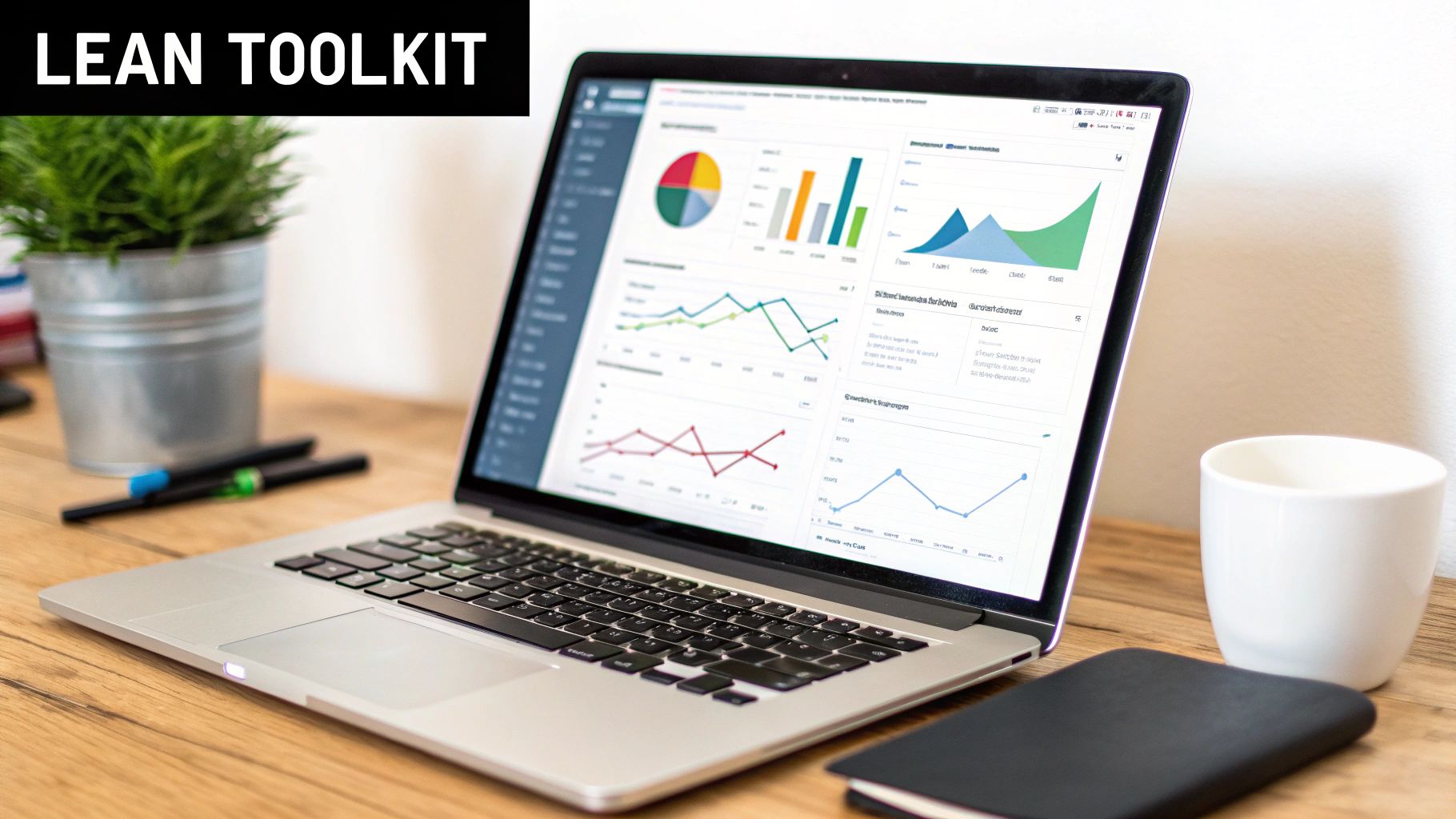
From this data, we can immediately see which paid keywords are bringing in the most traffic, giving us a clear road map for a counter-attack.
We built a targeted campaign around those neglected terms, and within a month, we had captured a huge portion of that traffic, unlocking a brand-new revenue stream for the client. That’s the kind of agile, insight-driven move a bloated, slow-moving agency simply can't make.
Decode Your Competitor's Entire Strategy (Like an Expert)
Just getting a list of your competitor's keywords is only step one. It tells you what they’re bidding on, but the real money is in understanding why.
This is where big, bloated agencies consistently drop the ball. They'll hand you a spreadsheet full of keywords and call it a day, completely missing the strategy behind the data. It's the difference between having a list of ingredients and having a Michelin-star recipe.
An expert doesn't just look at the data; they look through it. I’m not just seeing keywords; I'm reading the story your competitors are telling. Are they casting a wide net with high-volume, top-of-funnel terms? Or are they surgically precise, targeting high-intent, bottom-of-funnel keywords where people are pulling out their credit cards?
Knowing the difference is everything. It dictates your entire counter-strategy. And that’s what separates a dedicated consultant from a generic agency.
Uncovering Their Core Message
Ad copy is a goldmine. It’s where your rivals lay all their cards on the table, revealing their core messaging, their unique selling propositions (USPs), and the exact emotional buttons they’re trying to push.
As a specialist, I dissect their ads line by line to answer the important questions:
What's their main promise? Are they the cheapest, the fastest, the highest quality, or the best customer service?
Who are they talking to? Is the language aimed at bargain hunters, luxury shoppers, or B2B decision-makers?
What pain points are they hitting? Every good ad solves a problem. Pinpointing that problem gives you a direct look into their ideal customer profile.
This isn't about copying what they do. It's about finding the holes in their game—the gaps where your unique strengths can completely outmaneuver them. If they’re all about being the cheapest, you can crush them by being the best. That’s a strategic pivot most agencies, with their templated ad copy and slow approval process, are too slow or uncreative to even consider.
The goal isn't just to compete—it's to reframe the entire conversation on your terms. Once I have their playbook, I can write a better one for you.
The Message Match Principle Agencies Ignore
Now for the part where most campaigns completely fall apart. This is a critical failure point for over-extended agencies managing too many accounts. They might write a decent ad, but they dump all that hard-won traffic onto a generic, one-size-fits-all landing page.
It creates a jarring disconnect for the user, and it absolutely murders conversion rates.
I call this the ‘Message Match’ principle. It’s a dead-simple concept that’s shockingly powerful: the promise you make in the ad must be perfectly and immediately fulfilled on the landing page.
If your ad screams "50% Off Blue Widgets," the headline on that landing page better be "Get Your 50% Off Blue Widgets Here." This seamless experience builds instant trust and walks the user straight to the 'buy now' button.
Agencies often skip this because it takes time and detailed, painstaking work—the exact kind of work a dedicated consultant lives for. They build campaigns; I build conversion funnels.
To really get inside your competitors' heads, you need to look beyond just their keywords and analyze their presence across every channel. A key metric for this is covered in this excellent real guide to Share of Voice in advertising. By digging into their ad copy and landing pages, you're not just finding keywords; you're reverse-engineering their entire sales process to build a smarter, more profitable one for your own business.
Turn Competitor Insights Into Winning Campaigns
Gathering intel on your competitor’s keywords is just the start. The real magic happens when you turn that data into campaigns that actively steal their traffic. This is where an expert consultant's speed and precision create a massive advantage—something a large, slow-moving agency just can't replicate.
It's time to put those insights to work. The goal isn't just to copy what they're doing. It’s to find their weak spots, build a better strategy around them, and execute it before they even know what hit them.
Structure for a High Quality Score From Day One
First things first: we need to structure your new campaigns for maximum relevance right out of the gate. Big agencies often just dump new keywords into existing, bloated ad groups. This is a lazy, rookie move that tanks your Quality Score and drives up your costs.
A much, much better way is to create hyper-focused ad groups from the start.
I'm a huge advocate for Single Theme Ad Groups (STAGs). This just means that every ad group is built around a super-tight cluster of closely related competitor keywords.
Boosts Ad Relevance: Your ads speak directly to the specific terms in that group. Simple.
Increases Click-Through Rate (CTR): When people see ads that perfectly match what they just typed, they click.
Improves Quality Score: Higher relevance and CTR signal to Google that your ads are top-notch, which directly lowers your cost-per-click.
Is this meticulous setup more work upfront? Absolutely. But it's often dismissed as "too much work" by an over-extended agency account manager juggling 30 other clients. For a dedicated consultant whose reputation is on the line with every account, it’s just the right way to do things.
Write Ad Copy That Steals the Click
Once the structure is solid, it's all about writing ad copy that directly counters your competitor's messaging. You have to scrutinize their ads. Are they screaming about the lowest price? The fastest shipping? Whatever their angle is, you're going to use it to position your offer as the superior alternative.
If they’re the "cheap" option, your ad copy needs to be all about premium quality and long-term value. If they’re some big, faceless corporation, your ad should highlight personalized service and expert support. You aren't just bidding on their keywords; you're jumping into the conversation a searcher is already having and offering a better solution.
This visual shows the core flow of turning that competitor data into a winning strategy, all the way from keyword discovery to the final conversion.
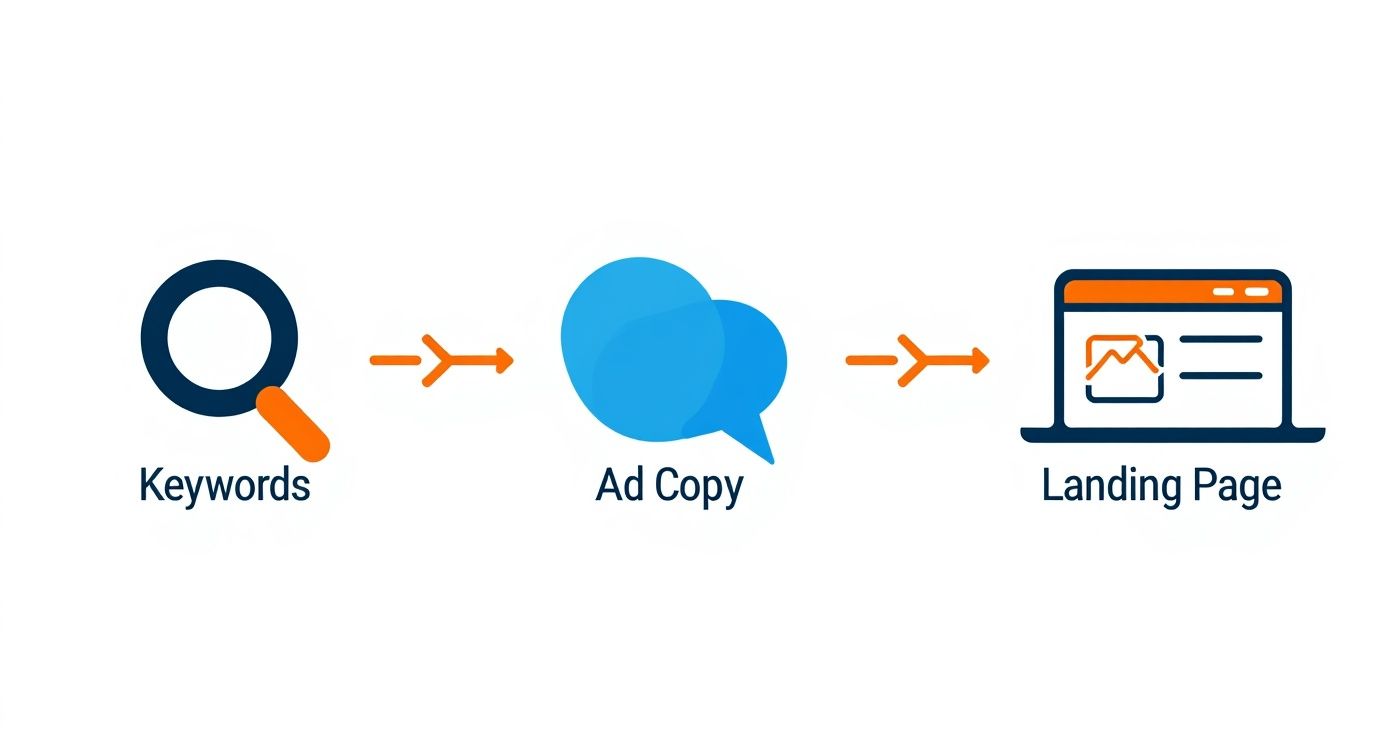
This simple, three-part framework—Keywords, Ad Copy, Landing Page—is the engine of any great campaign. Each part has to be perfectly aligned with the others to effectively capture and convert traffic.
A Real-World Example of a Consultant's Agility
I recently worked with an e-commerce client selling high-end coffee gear. A huge, well-funded competitor dominated their space, and the client's previous agency was frankly terrified to challenge them directly. So, we fired up Semrush and identified their single most profitable, non-branded keyword: "prosumer espresso machine."
Instead of avoiding it, we attacked.
We tore apart their landing page: It was generic, slow to load, and tried to sell every single machine at once. A classic, lazy agency mistake.
We built a better one: I coordinated the build of a sleek, fast-loading comparison page that specifically highlighted three top "prosumer" machines, complete with video reviews and a side-by-side feature chart.
We wrote laser-focused ad copy: My ads used headlines like "Tired of Overpriced Machines?" and "Expert Advice on Prosumer Espresso," which directly called out their weakness (high price) and showcased our strength (expert curation).
The result? In less than 30 days, we captured over 30% of the impression share for that top keyword. We didn't outspend them; we out-maneuvered them with a far superior user experience. This is the kind of rapid, strategic move that’s impossible for a slow agency tangled in red tape.
The stakes here are enormous. The global search advertising market is on track to hit US$351.55 billion in 2025, with Google's ad revenue alone hitting about $175 billion in 2023. With average CPCs hovering around $2.69, every single click matters. You can check out this deep-dive on search advertising trends for more on these numbers. This financial reality is exactly why a nimble, expert-led approach is so critical to winning your share of the market.
Bid Smart on Competitor Keywords (Not Just Louder)
Bidding on a competitor's brand name is one of the most hotly debated topics in Google Ads. Get it right, and you can intercept high-intent customers right when they’re about to make a decision. But get it wrong? You'll just burn cash in an expensive, ego-driven bidding war.
This is a move that demands surgical precision, not the brute-force approach you’ll see from many large agencies. Their incentive is often tied to jacking up your ad spend, and bidding on big competitor terms is a convenient way to do that. My goal as a consultant is different—it’s about pure, unadulterated ROI.
The hard truth is, this strategy isn't for everyone. It can be a total game-changer for a SaaS company trying to peel users away from an established player. But for a local plumber? It's usually a complete waste of money. The key is to detach from the ego of "beating" a rival and focus only on whether it's profitable.
The Expert Consultant's Decision Checklist
Unlike a bloated agency that might push you into a costly fight for vanity metrics, a dedicated consultant helps you make a smart, strategic call. Before you ever spend a single dollar on a competitor’s brand, we need to run through a simple but critical checklist.
Ask yourself these questions:
Is there clear search intent? Are people actively searching for things like "[Competitor Name] alternatives" or "reviews of [Competitor Name]"? If so, that’s a green light.
Do you have a better offer? You need a genuinely compelling reason for someone to ditch the brand they just searched for. This could be a lower price, more features, better support, or a killer free trial.
Can your budget handle the heat? Bidding on competitor PPC keywords almost always means lower Quality Scores and higher CPCs. You have to be prepared for this and track profitability obsessively.
What does the industry landscape look like? The level of competition can completely change whether this tactic works or not.
An agency sees competitor bidding as a way to spend more of your budget. I see it as a high-stakes tactical move that must be justified by clear, measurable profit from day one. If it doesn't make you money, we don't do it.
Why Industry Competition Matters
How viable this tactic is also depends heavily on your industry. A quick look at PPC keyword competition shows huge differences between sectors. For example, Local Services have it easy, with about 93 low-difficulty keywords for every tough one.
But then you look at Finance and SaaS, and it's a brutal 1:1 ratio of easy-to-hard keywords. That data tells us that a SaaS company bidding on a rival’s name needs to be ready for a sophisticated and costly fight to see any real results. You can dig into more on how keyword competition varies by industry in this Semrush study.
Ultimately, a good consultant will walk you through these variables. We'll explore the different Google Ads bidding strategies you need to know for 2025 and figure out if this aggressive approach actually aligns with your business goals. The aim is to make sure every dollar spent is an investment, not just an expense.
Your Burning Questions, Answered by an Expert
Let's cut through the noise. When it comes to PPC competitor analysis, a lot of myths and bad advice get thrown around by agencies that don't have your best interests at heart. Here are the straight-up answers to the questions I hear most often.
Is It Actually Legal to Bid on a Competitor's Brand Name?
Yes, it is. In places like the US and the UK, bidding on a competitor's trademarked brand keyword is fair game.
The one golden rule? You absolutely cannot use their trademark in your ad copy. The ad itself has to be 100% about you, your product, and the value you offer. Think of it as smart, ethical interception—not deception. You're simply showing up at the exact moment a potential customer is making a decision.
How Often Should I Be Spying on My Competitors?
Competitor analysis isn't a "set it and forget it" task. It’s an ongoing intelligence operation. I recommend a deep-dive analysis every quarter to stay aligned with bigger business goals.
But the real magic happens with lighter, monthly check-ins. This is where you spot new advertisers jumping into the auction, or a sudden, aggressive shift in a rival's strategy.
An agency might send you a stale quarterly report. A dedicated consultant is in the trenches daily, watching the landscape shift in near real-time. This gives you a massive advantage, letting you pivot on a dime.
Can I Realistically Compete With a Rival Who Has a Massive Budget?
Absolutely. In fact, this is where the game gets fun. This is precisely where a sharp, individual expert demolishes a bloated agency budget. You don't outspend a giant; you outsmart them.
Here's how we do it:
Target the long-tail keywords their process-driven teams completely ignore as "too small."
Build a higher Quality Score with ads and landing pages that are way more relevant and compelling.
Craft irresistible offers that their slow-moving corporate structure could never approve in time.
A nimble expert is trained to find and exploit the gaps that big, process-heavy agencies miss every single time. It's about being a sniper, not a machine gun.
Ready to stop guessing and start outmaneuvering your competition? Come Together Media LLC delivers the dedicated, one-on-one Google Ads expertise that bloated agencies simply can't provide. Let's find your competitors' blind spots together.




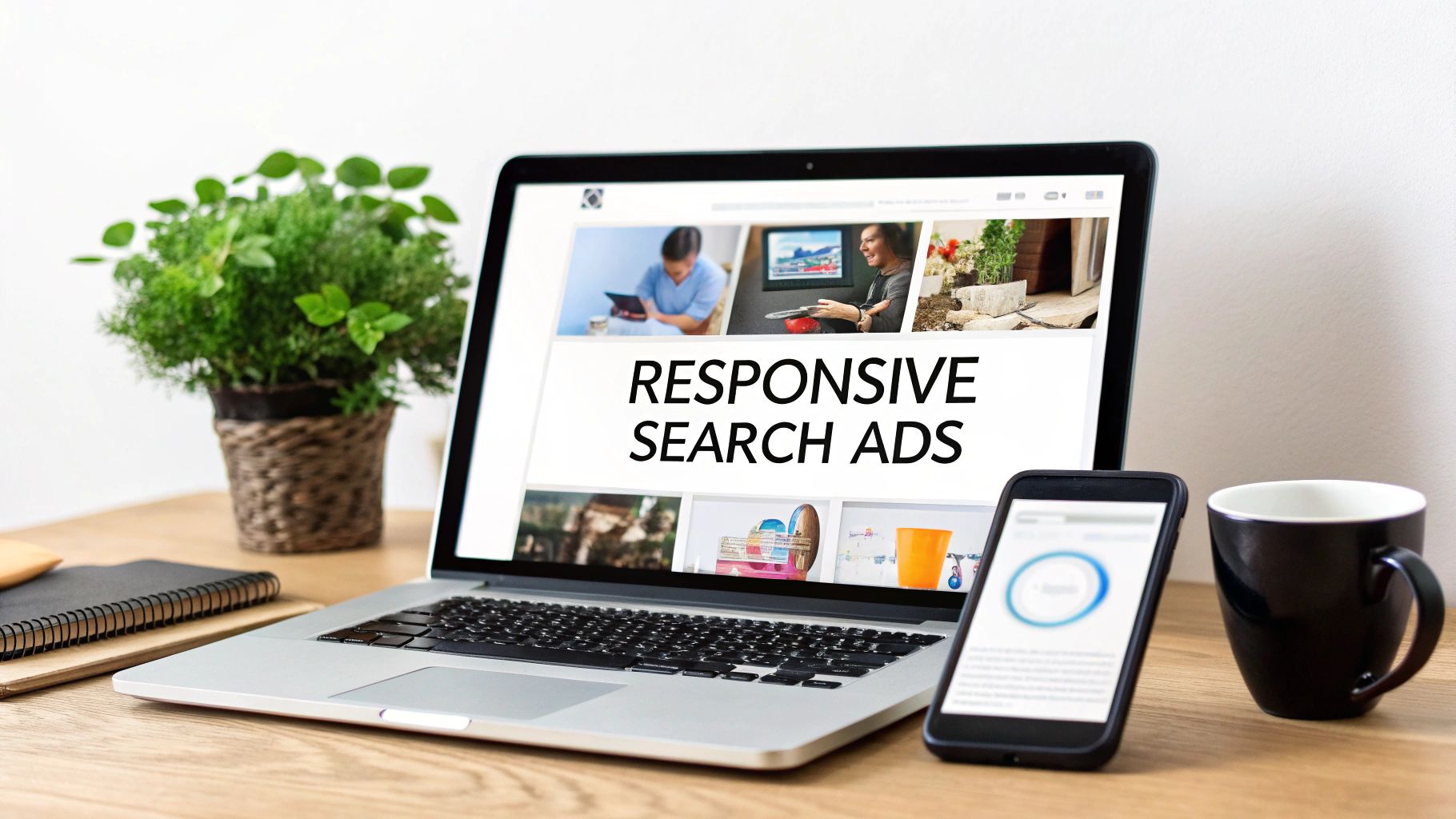
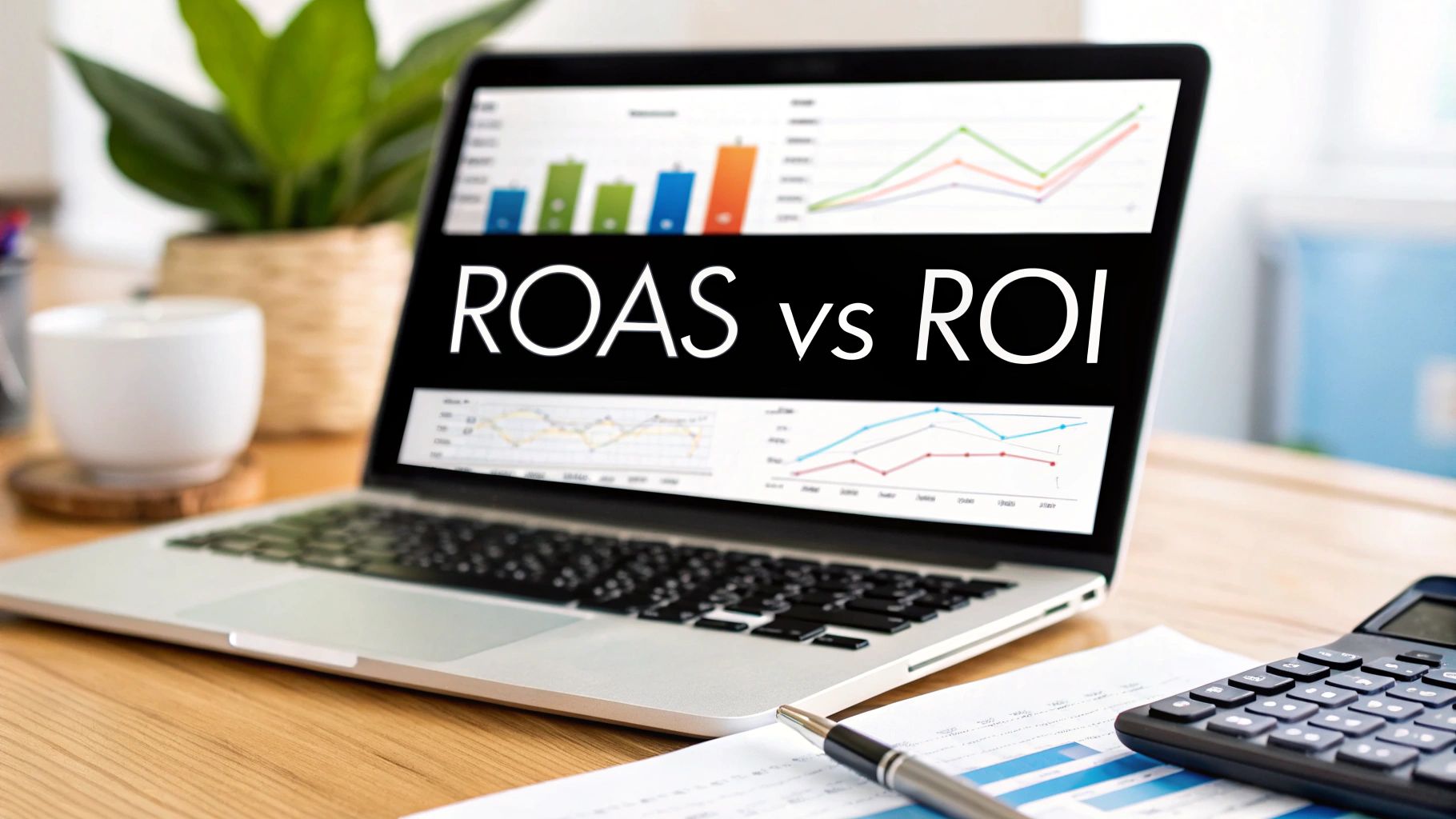
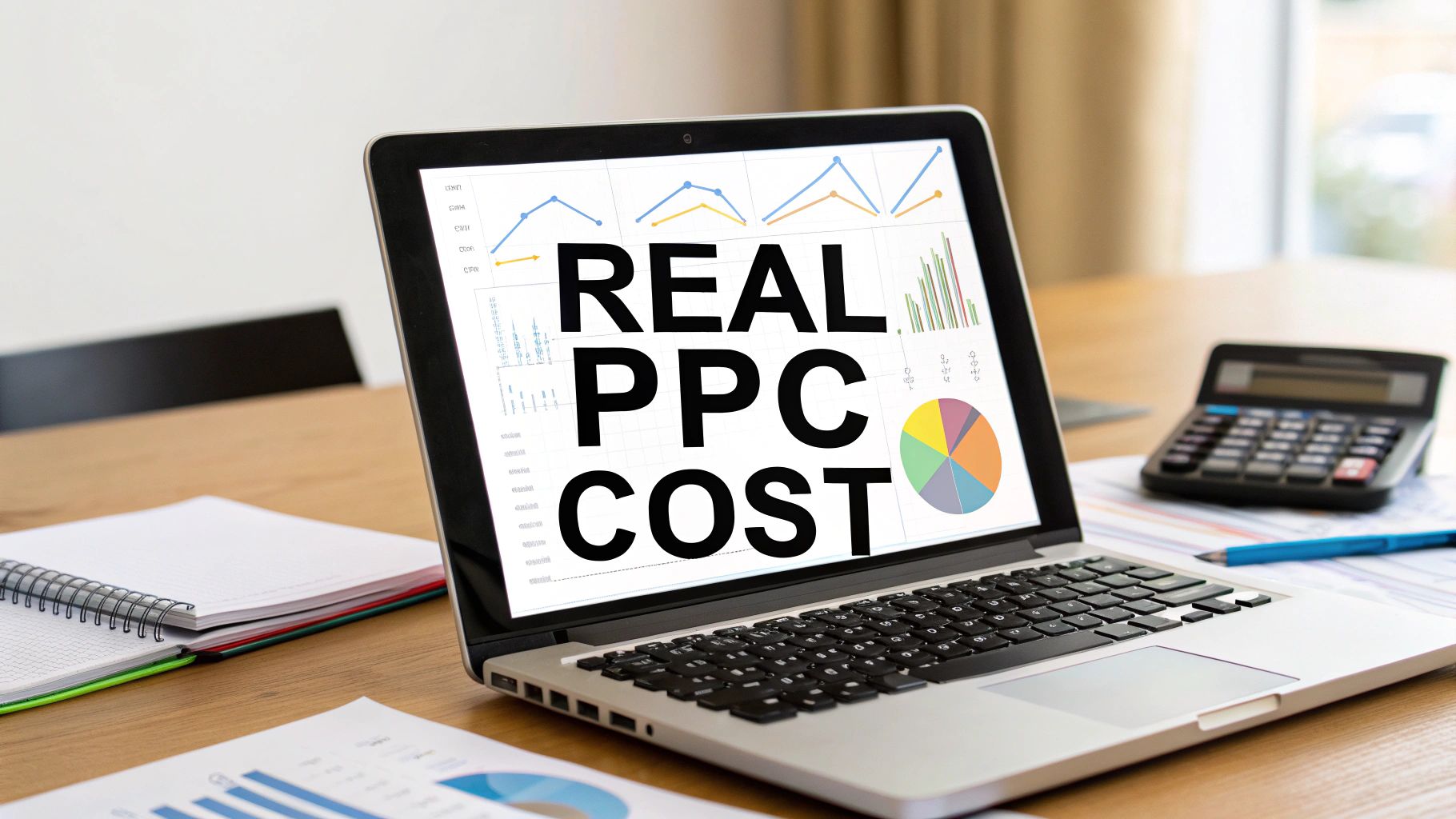
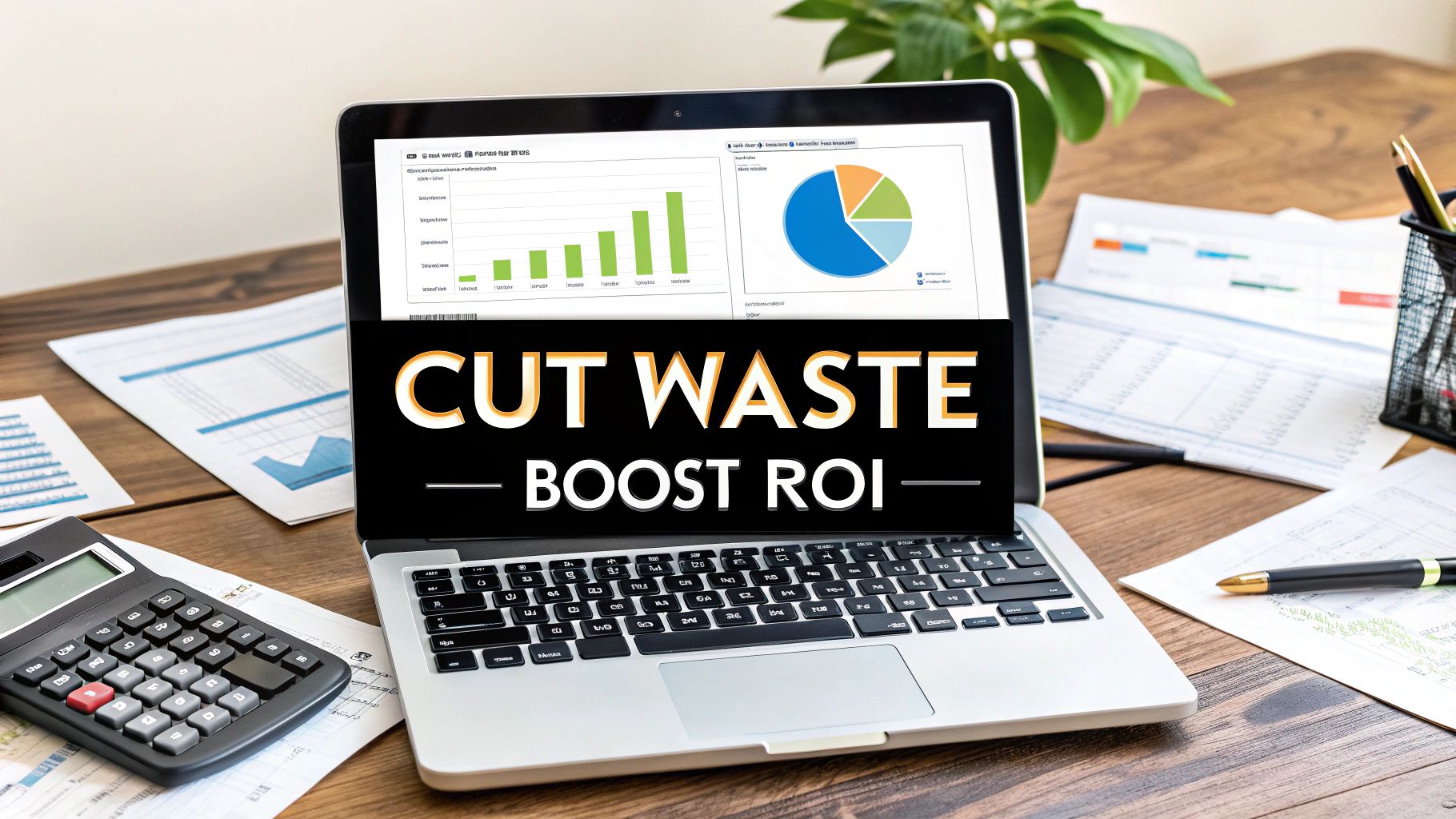
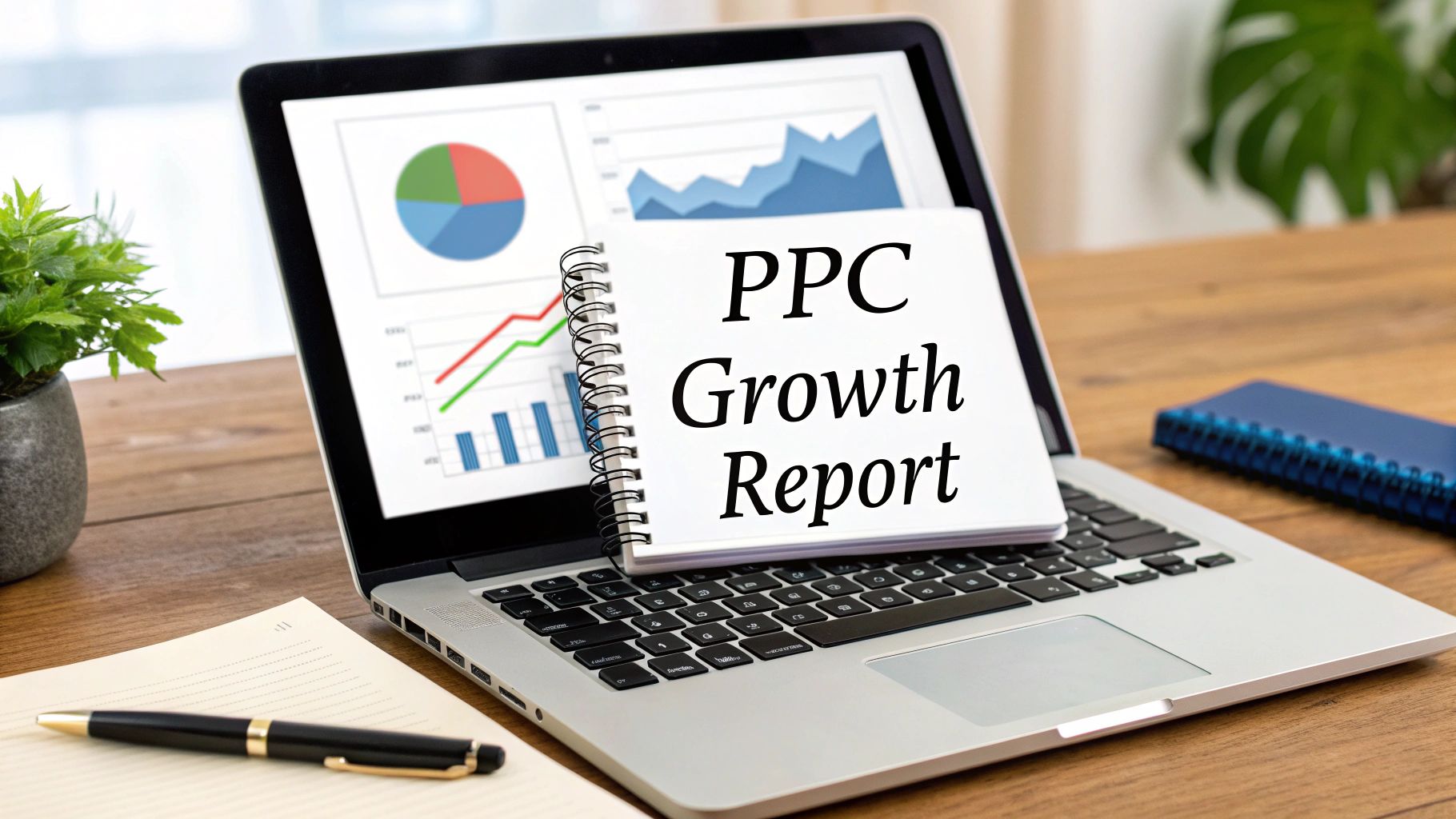
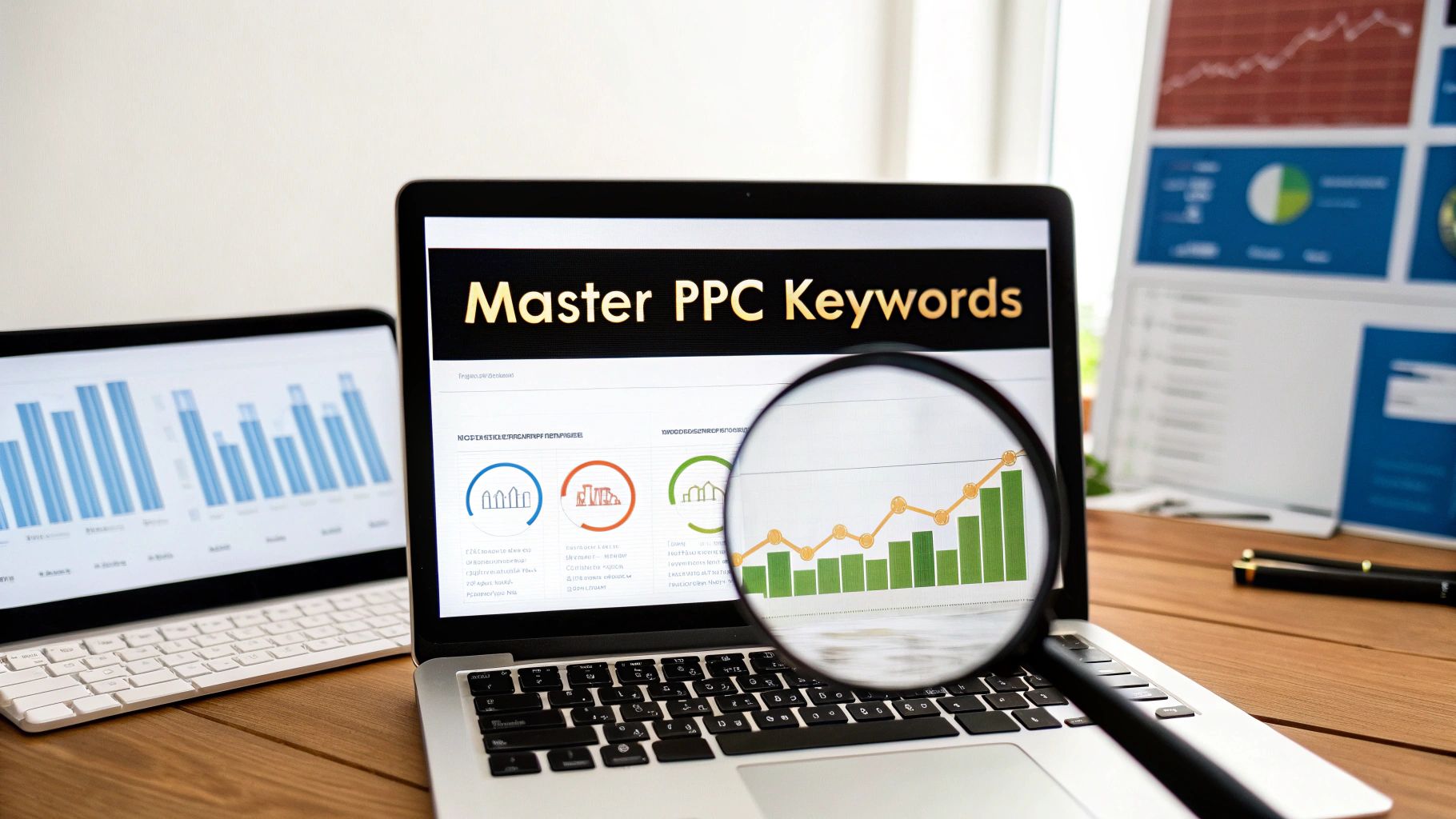
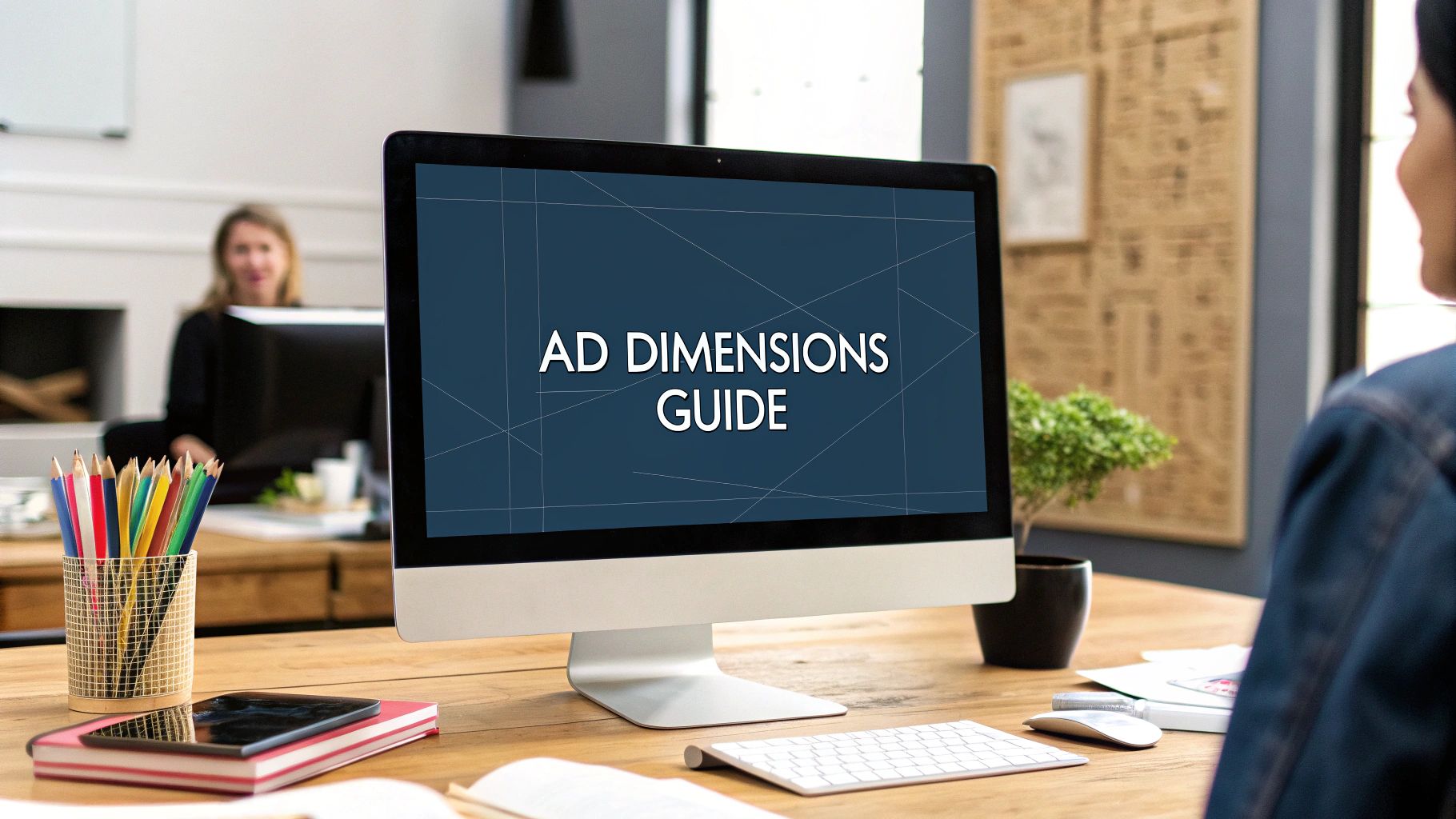
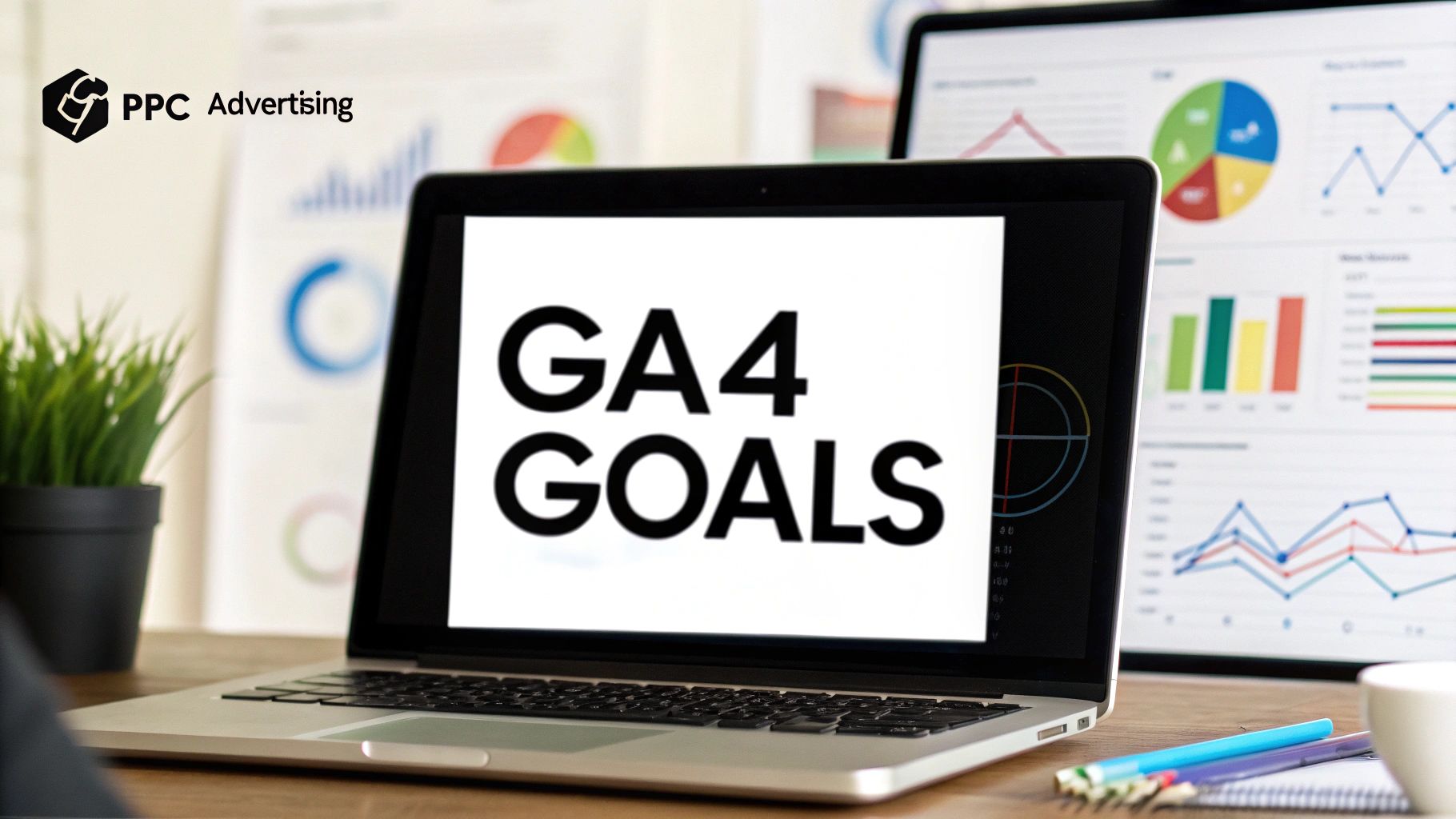
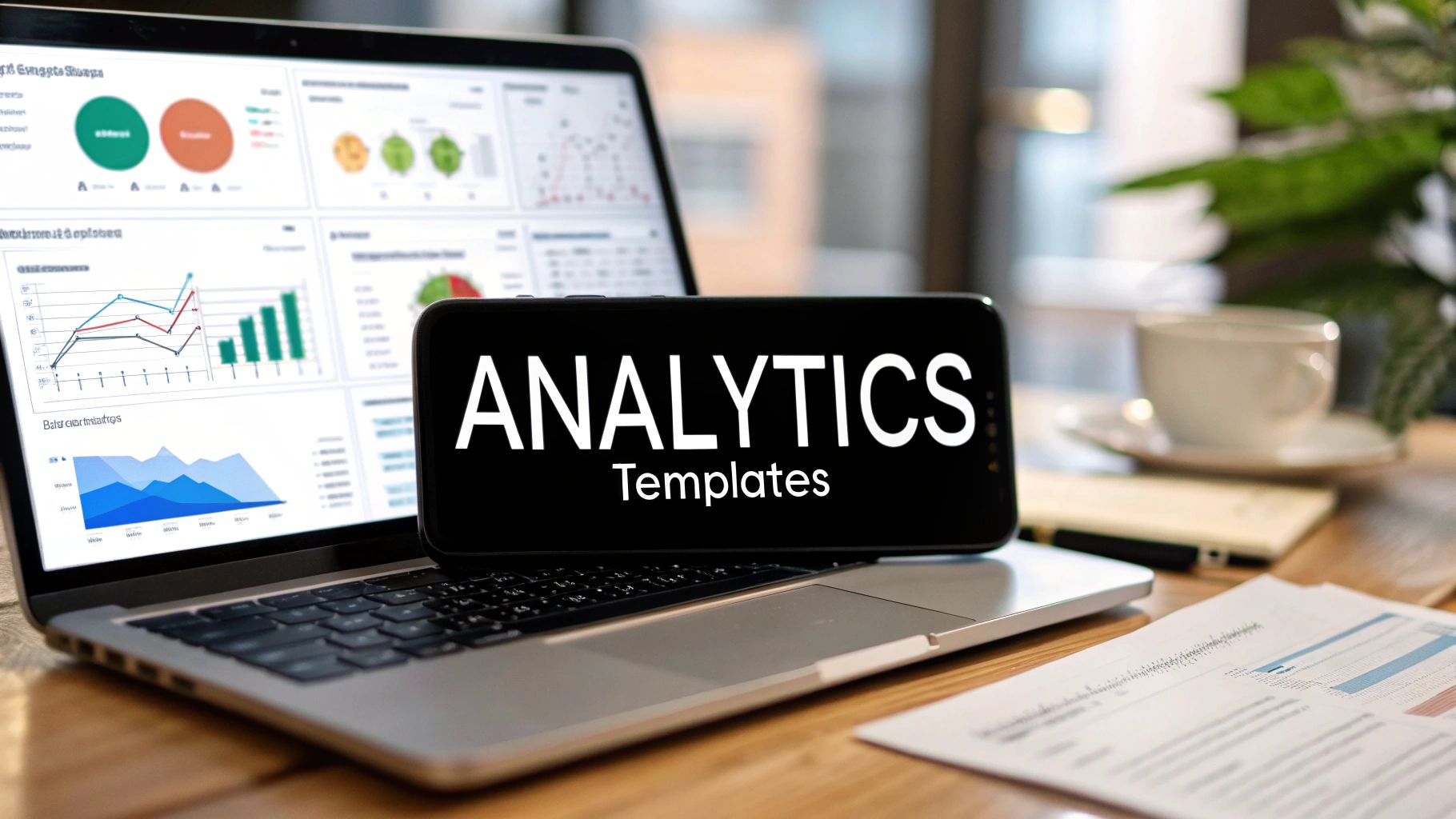

Comments